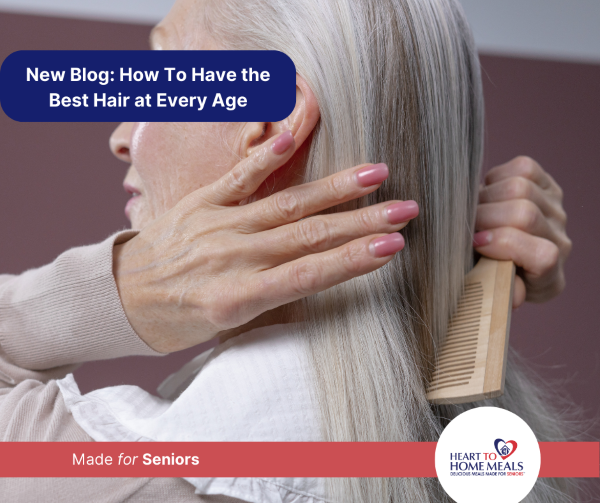.png.aspx)
As we age, our bodies face inevitable changes, and our hair is no exception. As older adults, our hair becomes thinner, duller, and grows at a slower rate. But just as we find ways to keep our skin looking its best, there are ways to maintain our hair’s health for lush locks at every age. Keep reading to learn how seniors can still have the best hair with minimal effort.
Regular Cuts and Trims
As hair grows it risks the chance of split ends and breakage, which can cause it to appear thinner. This is even more likely in the winter when hair is drier from the cold air. To help keep your hair healthy and protected, schedule regular haircuts and trims to keep ends strong and looking their fullest. Getting a cut every 6 to 8 weeks is a good rule of thumb but consult with a hairdresser to determine what the best timeline is for your hair.
Nutrient-Rich Diet
Just like other organs, your hair is greatly impacted by what you fuel your body with, which is why a well-balanced and nutrient-rich diet is essential to keeping your hair healthy. Hair is mostly composed of keratin protein, which is produced using amino acid building blocks obtained from food. To consistently supply protein to your hair follicles, incorporate poultry, lean meat, fish, eggs, nuts, beans, and other protein sources into every meal. Dry, brittle, tangled, and lack-luster hair can also be signs of low iron, vitamin C, and vitamin E. To help keep your hair strong and shining, be sure to add a wide variety of leafy greens, vegetables, nuts, and fruits into your daily meals. For those who practice a plant-based diet or have digestion complications, it may be difficult to work certain proteins and vitamins into your diet. If this is the case, consider supplements for amino acids, B12, iron, biotin and more as a means of powering your hair with the proper nutrients (as always, be sure to consult with your doctor and/or dietitian).
For seniors specifically, appetite tends to decline with age and cooking regular meals may become difficult with limited mobility. But skipping a meal is problematic as it sends your body into survival mode, reducing the supply of protein and nutrients to the hair follicles. For a convenient solution, Heart To Home Meals offers balanced, prepared meals for seniors so that you can get all the nutrients your hair needs to stay strong and lustrous without any of the work.
Learn more nutritional facts for seniors here so you can keep your hair looking its best!
Wash Only As Needed
How frequently you wash your hair depends on the hair density, thickness, and porosity you have, but regardless of your hair type, you should never wash your hair more than needed. A key component to growing healthy hair is keeping it nourished, and when you wash your hair too frequently, it can be stripped of its natural oils to become dry and brittle. Start out with washing your hair twice a week and see how your hair reacts. If you notice a lot of buildup and discomfort on your scalp, try increasing your washes.
Stimulate Blood Circulation to the Scalp
Although hair is a non-living structure, the follicles that produce it contain some of the most active cells in your body, which means our hair needs proper blood and oxygen supply to remain healthy. With poor blood circulation, you may see an increase in hair fall, and more dry, thinning hair. To help open blood vessels and prompt them to supply hair follicles with oxygen and nutrients, gently massage your scalp with your fingers at least once a day. For added benefits, try massaging with essential oils that promote blood circulation such as lavender, thyme, rosemary, cedarwood, and peppermint.
Reduce Stress
Chronic or extreme stress increases the risk of many health concerns, but it is also a big contributor to hair loss. There are two main phases that hair follicles cycle through: growth and resting. Majority of your hair follicles are in the growth phase, and when they pass into the resting phase, they shed from the scalp. However, when experiencing extreme emotional stress, such as the death of a loved one or combating an illness, our body releases hormones that disrupt our hair follicle cycle, causing more hairs to enter the resting phase and fall.
To help prevent and manage stress that will cause hair loss, practice coping strategies and learn new ways to keep stress at a minimum on a daily basis. Deep breathing exercises are helpful for high-stress experiences, and activities like meditation and yoga work to clear your mind and keep you feeling refreshed.


